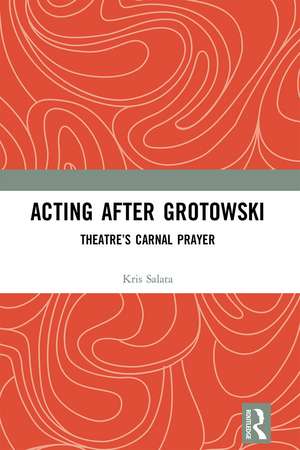Acting after Grotowski: Theatre’s Carnal Prayer
Autor Kris Salataen Limba Engleză Paperback – 13 dec 2021
Acting after Grotowski: Theatre’s Carnal Prayer attempts to overcome the religious/secular binary by treating "prayer" as a pre-religious, originary deed, and ultimately situates theatre along with ritual in their shared territory of play.
Grounded in theatre practice, Salata’s narrative moves through postmodern philosophy, critical theory, theatre, performance, ritual, and religious studies, concluding that the fundamental structure of prayer, which underpins the actor’s deed, can be found in any self-revelatory creative act.
| Toate formatele și edițiile | Preț | Express |
|---|---|---|
| Paperback (1) | 363.64 lei 6-8 săpt. | |
| Taylor & Francis – 13 dec 2021 | 363.64 lei 6-8 săpt. | |
| Hardback (1) | 845.69 lei 6-8 săpt. | |
| Taylor & Francis – 30 apr 2020 | 845.69 lei 6-8 săpt. |
Preț: 363.64 lei
Nou
Puncte Express: 545
Preț estimativ în valută:
69.64€ • 71.75$ • 58.34£
69.64€ • 71.75$ • 58.34£
Carte tipărită la comandă
Livrare economică 22 februarie-08 martie
Preluare comenzi: 021 569.72.76
Specificații
ISBN-13: 9781032236599
ISBN-10: 1032236590
Pagini: 150
Ilustrații: 1 Illustrations, black and white
Dimensiuni: 156 x 234 x 8 mm
Greutate: 0.22 kg
Ediția:1
Editura: Taylor & Francis
Colecția Routledge
Locul publicării:Oxford, United Kingdom
ISBN-10: 1032236590
Pagini: 150
Ilustrații: 1 Illustrations, black and white
Dimensiuni: 156 x 234 x 8 mm
Greutate: 0.22 kg
Ediția:1
Editura: Taylor & Francis
Colecția Routledge
Locul publicării:Oxford, United Kingdom
Public țintă
General, Postgraduate, and UndergraduateCuprins
Preface. Introduction. 1. Grotowski's Carnal Prayer 2. Two Performances of Prayer 3. The Rhizome of Working Points 4. For Whom Should I Perform? 5. On Prayer 6. The Event of the Encounter, the Event of Prayer. Epilogue.
Notă biografică
Kris Salata is Professor at the School of Theatre, College of Fine Arts in Florida State University, U.S.A.
Recenzii
Acting After Grotowski goes to the heart of the actor’s work: not merely why we act, nor how, but, rather, the foundational inseparability of these two questions. Ranging freely across disciplines, from theatre, to philosophy, to religious studies, to neuroscience, Salata investigates the "Grotowski Question" – for whom do I perform? – seeking answers in both the legacy of practice embodied in the contemporary investigations of the Workcenter of Jerzy Grotowski and Thomas Richards, and in Grotowski’s own writings on two key, hitherto under-examined, concepts: the "secure partner" and "carnal prayer." Rooting his analysis in a phenomenological approach to the scholar’s act of bearing witness, Salata has written a groundbreaking, interdisciplinary work which speaks to multiple audiences: theatre artists, theatre scholars, and philosophers concerned with the nature of human encounter, and performance as embodied philosophical praxis.
Dr. Kathryn Mederos Syssoyeva, author/editor: A History of Collective Creation, Collective Creation in Collective Performance, and Women, Collective Creation, and Devised Performance.
Acting after Grotowski looks at the core question of Jerzy Grotowski’s work, “For whom do I perform?” Salata (Florida State Univ.) uses a cross-disciplinary approach to examine the practical work from the famous Workcenter and Grotowski’s writings on the “carnal prayer” and the “secure partner.” Weaving together philosophy, theory, performance, ritual, religious studies, and phenomenology, Salata explores the idea of acting as a self-revelatory action. He seeks to bridge the secular and religious by positing that theater and ritual share the idea of play. This brief book is packed with information, first-person accounts, and points to ponder. Though the author does an excellent job relating Grotowski postmodern acting practice, those with a good foundation in Grotowski’s theory will connect best with the material. The writing is accessible for those schooled in theoretical study but will challenge the beginning actor or casual reader. As Salata readily observes, the progression of the book is nonlinear and polymorphous, an additional reading challenge. But this book will be a gold mine for those knowledgeable about acting theory.
--E. C. Skiles, Lone Star College-Kingwood
Dr. Kathryn Mederos Syssoyeva, author/editor: A History of Collective Creation, Collective Creation in Collective Performance, and Women, Collective Creation, and Devised Performance.
Acting after Grotowski looks at the core question of Jerzy Grotowski’s work, “For whom do I perform?” Salata (Florida State Univ.) uses a cross-disciplinary approach to examine the practical work from the famous Workcenter and Grotowski’s writings on the “carnal prayer” and the “secure partner.” Weaving together philosophy, theory, performance, ritual, religious studies, and phenomenology, Salata explores the idea of acting as a self-revelatory action. He seeks to bridge the secular and religious by positing that theater and ritual share the idea of play. This brief book is packed with information, first-person accounts, and points to ponder. Though the author does an excellent job relating Grotowski postmodern acting practice, those with a good foundation in Grotowski’s theory will connect best with the material. The writing is accessible for those schooled in theoretical study but will challenge the beginning actor or casual reader. As Salata readily observes, the progression of the book is nonlinear and polymorphous, an additional reading challenge. But this book will be a gold mine for those knowledgeable about acting theory.
--E. C. Skiles, Lone Star College-Kingwood
Descriere
For whom does the actor perform? Addressing this question, Acting after Grotowski focuses on an actor’s work as a self-revelatory deed. Introducing Grotowski’s concept of "carnal prayer," Kris Salata develops an interdisciplinary theory of acting and spectating, while lending thoughts to theatre as a liturgical performance.
